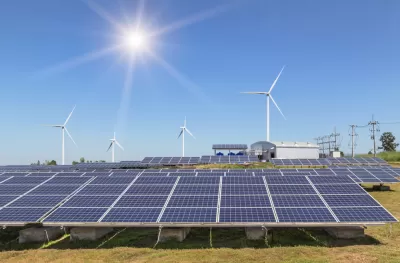The worldwide transition to renewable energy sources is already underway as climate change creates more significant impacts on the global supply chain and economy.

The global shift to renewable energy won’t be stopped by Trump’s election, asserts María Mendiluce in a piece for Forbes. According to Mendiluce, “Renewables are cheap and available everywhere and that is they are considered a major contributor to national security. Delaying the transition to clean solutions, will mean losing competitiveness vis a vis countries like China that will reap the benefits of their leadership in the development of clean energy supply chains (from extraction of critical materials and manufacturing, to combining clean solutions like renewables, electric vehicles and battery storage).”
Moreover, the market for renewable energy and its related infrastructure continues to grow, making it an economically advantageous shift. “It is a financial necessity, driven by the recognition that extreme events poses critical risks to global supply chains, business operations, and economic stability.”
Mendiluce offers some suggestions for participants at the COP29 conference. “To drive the energy transition, COP29 must produce a groundbreaking financial framework. Negotiators need to agree a new collective quantified goal for climate finance to mobilise significant private investment, particularly in low- and middle-income countries.” Mendiluce also calls for “robust, predictable” regulations to provide stability for the global scaling of renewables and an equitable transition for smaller enterprises and vulnerable communities.
FULL STORY: Renewable Energy Shift Unstoppable Despite U.S. Election Result

Maui's Vacation Rental Debate Turns Ugly
Verbal attacks, misinformation campaigns and fistfights plague a high-stakes debate to convert thousands of vacation rentals into long-term housing.

Planetizen Federal Action Tracker
A weekly monitor of how Trump’s orders and actions are impacting planners and planning in America.

In Urban Planning, AI Prompting Could be the New Design Thinking
Creativity has long been key to great urban design. What if we see AI as our new creative partner?

King County Supportive Housing Program Offers Hope for Unhoused Residents
The county is taking a ‘Housing First’ approach that prioritizes getting people into housing, then offering wraparound supportive services.

Researchers Use AI to Get Clearer Picture of US Housing
Analysts are using artificial intelligence to supercharge their research by allowing them to comb through data faster. Though these AI tools can be error prone, they save time and housing researchers are optimistic about the future.

Making Shared Micromobility More Inclusive
Cities and shared mobility system operators can do more to include people with disabilities in planning and operations, per a new report.
Urban Design for Planners 1: Software Tools
This six-course series explores essential urban design concepts using open source software and equips planners with the tools they need to participate fully in the urban design process.
Planning for Universal Design
Learn the tools for implementing Universal Design in planning regulations.
planning NEXT
Appalachian Highlands Housing Partners
Mpact (founded as Rail~Volution)
City of Camden Redevelopment Agency
City of Astoria
City of Portland
City of Laramie





























